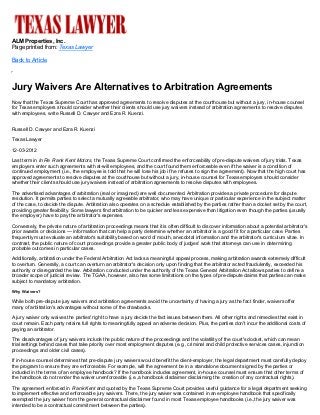
Jury Waivers are Alternatives to Arbitration Agreements
- 1. ALM Properties, Inc. Page printed from: Texas Lawyer Back to Article Jury Waivers Are Alternatives to Arbitration Agreements Now that the Texas Supreme Court has approved agreements to resolve disputes at the courthouse but without a jury, in-house counsel for Texas employers should consider whether their clients should use jury waivers instead of arbitration agreements to resolve disputes with employees, write Russell D. Cawyer and Ezra R. Kuenzi. Russell D. Cawyer and Ezra R. Kuenzi Texas Lawyer 12-03-2012 Last term in In Re Frank Kent Motors, the Texas Supreme Court confirmed the enforceability of pre-dispute waivers of jury trials. Texas employers enter such agreements with at-will employees, and the court found them enforceable even if the waiver is a condition of continued employment (i.e., the employee is told that he will lose his job if he refuses to sign the agreement). Now that the high court has approved agreements to resolve disputes at the courthouse but without a jury, in-house counsel for Texas employers should consider whether their clients should use jury waivers instead of arbitration agreements to resolve disputes with employees. The advertised advantages of arbitration (real or imagined) are well documented. Arbitration provides a private procedure for dispute resolution. It permits parties to select a mutually agreeable arbitrator, who may have unique or particular experience in the subject matter of the case, to decide the dispute. Arbitration also operates on a schedule established by the parties rather than a docket set by the court, providing greater flexibility. Some lawyers find arbitration to be quicker and less expensive than litigation even though the parties (usually the employer) have to pay the arbitrator's expenses. Conversely, the private nature of arbitration proceedings means that it is often difficult to discover information about a potential arbitrator's prior awards or decisions — information that can help a party determine whether an arbitrator is a good fit for a particular case. Parties frequently must evaluate an arbitrator's suitability based on word of mouth, anecdotal information and the arbitrator's curriculum vitae. In contrast, the public nature of court proceedings provide a greater public body of judges' work that attorneys can use in determining probable outcomes in particular cases. Additionally, arbitration under the Federal Arbitration Act lacks a meaningful appeal process, making arbitration awards extremely difficult to overturn. Generally, a court can overturn an arbitrator's decision only upon finding that the arbitrator acted fraudulently, exceeded his authority or disregarded the law. Arbitration conducted under the authority of the Texas General Arbitration Act allows parties to define a broader scope of judicial review. The TGAA, however, also has some limitations on the types of pre-dispute claims that parties can make subject to mandatory arbitration. Why Waivers? While both pre-dispute jury waivers and arbitration agreements avoid the uncertainty of having a jury as the fact finder, waivers offer many of arbitration's advantages without some of the drawbacks. A jury waiver only waives the parties' right to have a jury decide the fact issues between them. All other rights and remedies that exist in court remain. Each party retains full rights to meaningfully appeal an adverse decision. Plus, the parties don't incur the additional costs of paying an arbitrator. The disadvantages of jury waivers include the public nature of the proceedings and the volatility of the court's docket, which can mean trial settings behind cases that take priority over most employment disputes (e.g., criminal and child protective services cases, injunction proceedings and older civil cases). If in-house counsel determines that pre-dispute jury waivers would benefit the client-employer, the legal department must carefully deploy the program to ensure they are enforceable. For example, will the agreement be in a standalone document signed by the parties or included in the terms of an employee handbook? If the handbook includes agreement, in-house counsel must ensure that other terms of the handbook do not render the waiver unenforceable (i.e.,a handbook disclaimer disclaiming the creation of any contractual rights). The agreement enforced in Frank Kent and quoted by the Texas Supreme Court provides useful guidance for a legal department seeking to implement effective and enforceable jury waivers. There, the jury waiver was contained in an employee handbook that specifically exempted the jury waiver from the general contractual disclaimer found in most Texas employee handbooks (i.e.,the jury waiver was intended to be a contractual commitment between the parties).
- 2. I agree that with respect to any dispute between [Frank Kent] and me to resolve any disputes between us arising out of or in any way related to the employment relationship (including, but not limited to, employment and discontinuation of employment) before a judge without a jury. [FRANK KENT] AND EACH EMPLOYEE THAT SIGNS THIS ACKNOWLEDGMENT, RECEIVES A COPY OF THIS HANDBOOK, HAS KNOWLEDGE OF THIS POLICY, AND CONTINUES TO WORK FOR [FRANK KENT] THEREAFTER, HEREBY WAIVES THEIR RIGHT TO TRIAL BY JURY AND AGREE TO HAVE ANY DISPUTES ARISING BETWEEN THEM RESOLVED BY A JUDGE OF A COMPETENT COURT SITTING WITHOUT A JURY. The Frank Kent waiver was conspicuous. It was in all caps, bolded. The Frank Kent agreement also provided that the employee and employer were waiving their right to a jury trial, thereby providing adequate consideration for the promises. Finally, the provision stated that it applied to any party receiving a copy of the policy or who was provided notice of the policy, and it stated that continued employment thereafter was deemed acceptance of the jury waiver. While a party most often will prove acceptance of the waiver by showing a signed handbook acknowledgment form, this is still a useful provision to include in the waiver itself. While an agreement to resolve disputes in court without a jury may not be appropriate for every employer in every Texas location, jury waivers can provide an effective dispute resolution tool for employers to use in resolving disputes with their employees. Copyright 2012. ALM Media Properties, LLC. All rights reserved.
